Jarod talks about the dominance of Nike and Under Armour this year and how they outperformed all other competition in the clothing industry in one of his earlier blog posts. Both of the company’s stock prices have increased dramatically this year. This is partially due to the stellar season of some of their athletes. For example, Under Armour sponsors PGA Tour golfer Jordan Spieth, who just won his first two majors this year – The Masters and US Open. Seeing Jordan wearing the Under Armour logo, winning two of the biggest golf tournaments of the season, will no doubt inspire others to get a taste of victoy by purchasing Under Armor clothing. Nike has also experienced a great season with the athletes it sponsors. One of the athletes they sponsor is one of the greatest soccer players of all time – Cristiano Ronaldo, who scored 61 goals last season (beating Lionel Messi by 3 goals). Although we have not talk about using athletes to promote a business in class, I think it is an essential part of a business that already has a strong foothold in an industry – such as Nike and Under Armor. Having an athlete performing at the top of his game gives the company that extra edge, pushing consumers to purchase their product and the idea that “winners” wear the same product.
Monthly Archives: November 2015
Commentary on Richard Branson’s External Blog
Richard Branson is one of Britain’s wealthiest entrepreneurs with a net worth of $5 billion. He made his fortune by starting the brand name Virgin – a name now associated with businesses all over the world (Virgin Airways, Virgin Mobile, Virgin Money). In one of Richard Branson’s blogs, he discusses his views on creating a formal business plan for start-up companies. Branson, at the start of his business career, admits to not making a business plan – he thought that it was simply boring. However, he later realized how important a business plan was to keep him on track not only when pitching his idea to future investors, but to keep his mind on the right track as well. This raises a very important point when it comes to business plans. Relating it back to class, we learned that it is vital that you have a sense of direction for your business. And with the help of a business plan, you never forget where your ultimate goal lies. Branson agrees with the importance of creating a business plan at the start of a business’ life, and now, shares his advice for his blog readers to capitalize on.
Commentary on Adrienne Ellis’ Blog
Adrienne discusses in one of her blogs the unethical standards that some businesses (specifically Massey Energy’s Mine) promote with the aim to earn higher profits. Massey’s Energy Mine experienced a devastating explosion in one of their West Virginia mines that left 30 minors dead. When Massey Energy’s Mine finally went under investigation, it was determined that the company was violating work place safety hazards for its workers in the mine. As a result, the company’s CEO, Donald Blankenship, is now facing criminal charges.
I agree with Adrienne that it is the corrupt leaders of these labour companies who decide to disregard government regulations because they want to produce at a cheaper cost. It is obviously a problem considering the fact that workplace fatalities have been diminishing over the last 50 years. The fact that these company leaders put profits before human safety is definitely a question of ethics and morality. Yet it is only when fatal incidents occur that these rule-breakers are found and disciplined for deaths that could have been avoided.
Although there are definitely moral company leaders out in the world today, it only requires one or two immoral ones to ruin the image of an industry. That is going to have to change for society to continue lowering its death toll in the labour industries.
Toms Shoes One-for-One Business Model

I do not agree with the “one-for-one” business model because, as Andreas Widmer explains, it pushes local businesses out of the market, which ultimately holds back the local economy. Although Toms Shoes meant no harm when it first implemented this strategy, it did affect many local businesses, as they could not compete with something that was being bought for free. The “one-for-one” business model has been criticized by many reporting agencies, such as The New York Times, for “undermining local businesses by creating an entirely unsustainable aid-based economy”. Yes, people in these poor countries are receiving free items to help better their lifestyle, but they are in a no better position to afford these clothing items than they were in the first place. This causes problems with the local businesses – as they cannot sell their goods for free, and with the people of these countries – who still cannot afford to buy from the local businesses. Moreover, this business model ultimately raises Toms Shoes’ operating costs. They are producing two pairs of shoes for every pair sold – a business plan not optimal for producing a profit, but a policy that they have adopted in attempt to make a difference in less fortunate countries. While the idea behind Toms Shoes’ business plan meant well, it came with many hidden consequences, which negatively affect the surrounding local economies.
Sources
- Davenport, Cheryl. The Broken “Buy-One, Give-One” Model: 3 Ways To Save Toms Shoes. N.p.: Fast Company, n.d. Web. 17 Nov. 2015. <http://www.fastcoexist.com/1679628/the-broken-buy-one-give-one-model-three-ways-to-save-toms-shoes>.
- Wadhams, Nick. Bad Charity? (All I Got Was This Lousy T-Shirt!). N.p.: New York Times, n.d. Web. 17 Nov. 2015. <http://content.time.com/time/world/article/0%2C8599%2C1987628%2C00.htm>
- Wharton School of Business. The One-for-one Business Model: Avoiding Unintended Consequences. N.p.: University of Pennsylvania, n.d. Web. 17 Nov. 2015. <http://www.fastcoexist.com/1679628/the-broken-buy-one-give-one-model-three-ways-to-save-toms-shoes>.
Air Canada Class Act
In light of the recent terrorist attack in Paris, Air Canada has decided to waive travel change fees for its customers for the next two days; however, they will not halt flights to and from Paris. This act of goodwill will affect Air Canada’s revenues, as there will be many travelers frantically changing travel plans to avoid the famous tourist destination. Through this decision, Air Canada is demonstrating how much they value their customers by providing this temporary “pain reliever”. Although waiving two days worth of fees is a relatively small portion of the company’s revenue, it reveals that Air Canada truly does care for its customers and that the company is prepared to make efforts that will minimize customer anxiety. Air Canada’s goal in implementing this decision is to increase customer satisfaction, which in turn, will hopefully produce greater revenues for the company. We learned in class that it is important to keep your customers satisfied in order to stay in business and remain competitive. Air Canada is attempting to differentiate itself from its competitors to keep its existing customers happy, but also perhaps to attract new ones. Nevertheless, this class act from Air Canada will be greatly appreciated by its passengers travelling to and from Paris in this dangerous time.
Sources
- Slattery, Jill. Air Canada to waive fees for customers changing travel plans to Paris. Vancouver: Vancity Buzz, n.d. Web. 14 Nov. 2015. <http://www.vancitybuzz.com/2015/11/air-canada-waive-fees-customers-paris/>.
Valeant Pharmaceuticals Stock Plummets
Drug companies have a history of raising the prices of their drugs with the aim to increase revenue and profits. Obviously this is a big concern regarding moral standards and ethics, but it can also lead to government intervention, which can dramatically influence the company’s market position.
Valeant Pharmaceuticals is a drug company whose stock price has experienced a significant decrease in the last two months, going from $320 per share in September to $110 per share in November. Earlier this year, they raised the prices of Nitropress and Isuprel by 6 times and 3 times, respectively. This raised concerns with the government, and also US presidential candidate Hilary Clinton, who came up with a proposal to regulate drug prices, which combined, saw Valeant Pharmaceuticals stock price plummet.
In class, we learned that it is important for companies to keep shareholders happy, whether that be with increasing stock prices or paying out dividends, in order for the company to continue to be able to find capital. However, when large shareholders lose enormous amounts of money (such as Pershing Square Holding losing $2 billion) the credibility of Valeant Pharmaceuticals decreases, making it hard for investors to make that decision.
Valeant Pharmaceuticals must deal with their current market and financial situation with caution, as the decisions they make now will influence the future of their product and company’s credibility.
Sources
- Gandel, Stephen. What the drop in Valeant’s stock says about hedge funds’ herd mentality. N.p.: Fotune, n.d. Web. 10 Nov. 2015.
- Healy, Patrick, and Margot Sanger-Katz. Hillary Clinton Proposes Cap on Patients’ Drug Costs as Bernie Sanders Pushes His Plan. N.p.: New York Times, n.d. Web. 10 Nov. 2015.
- Pollack, Andrew. Aleant Chief Says Issues Stem From Fast Growth. N.p.: The New York Times, n.d. Web. 10 Nov. 2015.
Trudeau Takes Charge

Justin Trudeau has recently been appointed Canada’s new Prime Minister, replacing 10-year veteran Stephen Harper, and rejuvenating Canadian spirit with an ambitious plan to continue economic growth and improve Canada’s financial situation. Trudeau’s intends on investing billions of dollars into Canada’s infrastructure, and increasing taxes on Canada’s top 1% income earners.
One of the concerns with Trudeau pouring billions into Canada’s outdated infrastructure is that Canada’s balance would return to a deficit. However, despite this concern, it will also provide enormous opportunities for construction and engineering companies that will help grow and stabilize Canada’s economy further. Trudeau needs to determine if Canada would be able to generate enough income to operate after investing into big infrastructural projects before committing to this idea.
Trudeau also plans on raising taxes on the top 1% income earners in Canada. The new tax plan would introduce a new tax bracket of 33% for households earning more than $200,000 per year, and lower the 22% tax bracket to 20.5% for households earning between $44, 701 and $89, 401 per year. Justin Trudeau is hoping that higher federal tax rates will encourage wealthy individuals and corporations to invest in the Canadian economy. Personally, I believe that with increased taxes, wealthy households will be even more determined to find ways to avoid paying, which will ultimately lower Canada’s income, negatively affecting the Canadian economy.
Sources
- CBC News. Justin Trudeau defends proposed tax hike on wealthy in Bay Street speech. N.p.: The Canadian Press, n.d. Web. 9 Nov. 2015. <http://www.cbc.ca/news/politics/justin-trudeau-defends-proposed-tax-hike-on-wealthy-in-bay-street-speech-1.3069236>.
- Curry, Bill, and Barrie McKenna. What a Liberal victory would mean for Canada’s economic policies. Ottawa: The Globe and Mail, n.d. Web. 9 Nov. 2015. <http://www.theglobeandmail.com/news/politics/what-the-liberals-economic-plan-would-mean-for-canada/article26838610/>.
- Posadzki, Alexandra. Canadian business leaders assess impact of Liberal victory. Toronto: The Canadian Press, n.d. Web. 9 Nov. 2015. <http://www.ctvnews.ca/business/canadian-business-leaders-assess-impact-of-liberal-victory-1.2618339>.





